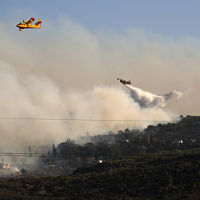
 |
|

|
Nuclear Threat A nuclear blast is an explosion with intense light and heat, a damaging pressure wave and widespread radioactive material that can contaminate the air, water and ground surfaces for miles around. During a nuclear incident, it is important to avoid radioactive material, if possible. While experts may predict at this time that a nuclear attack is less likely than other types, terrorism by its nature is unpredictable. If there is advanced warning of an attack Take cover immediately, as far below ground as possible, though any shield or shelter will help protect you from the immediate effects of the blast and the pressure wave. If there is no warning  Quickly assess the situation. Quickly assess the situation.  Consider if you can get out of the area or if it would be better to go inside a building to limit the amount of radioactive material you are exposed to. Consider if you can get out of the area or if it would be better to go inside a building to limit the amount of radioactive material you are exposed to.  If you take shelter go as far below ground as possible, close windows and doors, turn off air conditioners, heaters or other ventilation systems. Stay where you are, watch TV, listen to the radio, or check the Internet for official news as it becomes available. If you take shelter go as far below ground as possible, close windows and doors, turn off air conditioners, heaters or other ventilation systems. Stay where you are, watch TV, listen to the radio, or check the Internet for official news as it becomes available.  To limit the amount of radiation you are exposed to, think about shielding, distance and time. To limit the amount of radiation you are exposed to, think about shielding, distance and time.  Shielding: If you have a thick shield between yourself and the radioactive materials, more of the radiation will be absorbed, and you will be exposed to less. Shielding: If you have a thick shield between yourself and the radioactive materials, more of the radiation will be absorbed, and you will be exposed to less.  Distance: The farther away you are away from the blast and the fallout the lower your exposure. Distance: The farther away you are away from the blast and the fallout the lower your exposure.  Time: Minimizing time spent exposed will also reduce your risk. Time: Minimizing time spent exposed will also reduce your risk. Use available information to assess the situation. If there is a significant radiation threat, health care authorities may or may not advise you to take potassium iodide. Potassium iodide is the same stuff added to your table salt to make it iodized. It may or may not protect your thyroid gland, which is particularly vulnerable, from radioactive iodine exposure. Plan to speak with your health care provider in advance about what makes sense for your family. For more information, see Potassium Iodide from Centers for Disease Control. For more general information, see "Are you Ready?" from Federal Emergency Management Agency. |
|
|||||||||||||||||||||||
| Mary Greeley Medical Center, 1111 Duff Avenue, Ames, Iowa 50010, (515) 239-2011 | |||||||||||||||||||||||||
| ©2025 FastHealth Corporation Terms Privacy | US Patent Numbers 7,720,998 B2, 7,836,207 |